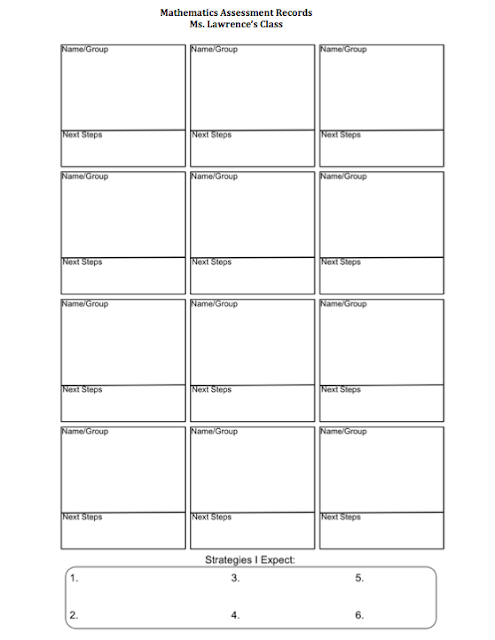A lot has changed in the
past decade in terms of assessing and evaluating in the classroom. When I was
in school, I remember being assigned questions (usually from a textbook) and
taking them up at the end of the class or the next day. I remember the teacher
calling on students to call out the answer. Once someone said the right answer,
we moved on. I didn’t think of it then, but looking back now, I bet there were
a lot of kids that stayed quiet out of embarrassment because they still didn’t
understand that method of arriving at the correct answer.
Today, educators have come
so far in how they assess and evaluate their students. Assessment is key for
both the students and the teacher. Assessment
is the ongoing collection of information indicating strengths, areas that need
improvement, understanding, misconceptions, strategies used, questions asked,
etc. Students use this feedback to help them understand exactly what they
need to do to move forward and be successful.
Assessment is also beneficial
to the teacher because it is very telling in regards to the students’
abilities. There are three kinds of assessment: Assessment for learning
(diagnostic); Assessment as learning (formative); Assessment of
learning (summative). The terms in parentheses are there because those are the “old”
terms we used when discussing assessment. I’m sure I’m not the only one who
catches themselves still using them every now and then. It’s important to do an
assessment for learning to determine each child’s abilities. Everyone’s
abilities differ, as do their learning styles. This assessment will help you
see where the class is at and what you will need to teach them. The assessment
as learning is, in my opinion, the most crucial and most often used form of
assessment because it is the ongoing tracking of student progress. Each time
your students complete a task, you, the teacher, are always monitoring,
questioning, taking notes, etc. Essentially, you are documenting what you
observe. This massive collection will bring you to a firm decision when doing
an assessment of learning. I can remember doing a final unit test and whatever
that mark was, that was the one going on my report card. Assessment needs to be
treated as a journey; you need to look at all the notes you have made while you
were assessing as learning and look at the formal descriptive feedback you created mid-unit. The
summative task is a nice way to bring everything together and see how the
students can apply what they have learned; but everyone has off days and one
single assessment can’t fairly be used as a final assessment. An evaluation is a final mark or value that
looks at the student’s progress and abilities at the end of a unit. This
means that in order to give a final grade, the teacher must look at the
progress made throughout the unit to make an informed decision.
I love this way of
teaching and assessing but I know that if it is new to me, it’s going to be new
to parents. It’s important to keep parents informed so that they do not panic
when they aren’t getting marked work back all the time, or they don’t see
traditional tests coming home. I created this newsletter as an assignment but
I designed it so that I would actually use it in my own classroom. I think it’s
written in family-friendly language so that parents have a good understanding
about how their children will be assessed and evaluated in the classroom.
While we’re talking about
assessment, I thought I’d share with you my assessment tracking sheet I use
when I pace the room and conference with students. This works well with pairs
due to the number of boxes, which is fine because I often assess this way when
the children work in pairs. Having a list of expected strategies makes it
really easy to just jot down the observation as a code, rather than write
everything out. Going in with an anticipated outcome makes assessing much
easier! Click the picture to get a free copy!





No comments:
Post a Comment